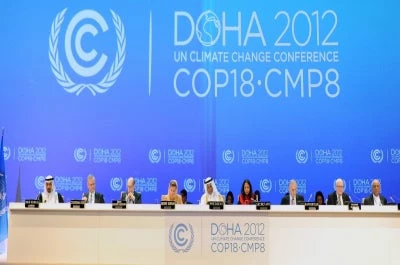This week, negotiators from nearly 200 countries have gathered at the UN Climate Conference in Doha to try to hammer out an agreement on a second commitment period of the Kyoto Protocol.
Once again, the gathering of the parties to the Framework Convention on Climate Change highlights the lack of action on climate change, and the subsequent threat to the prosperity of millions. Climate change may roll back decades of development.
Several reports in the last month have reached the same conclusion. First, the science is unequivocal: humans are the cause of global warming, and major changes can be observed today. Second, time for action is running out – if we don’t act, we could experience a 4°C warmer world this century, with catastrophic consequences.
The World Bank commissioned the Potsdam Institute for Climate Impact Research and Climate Analytics to better understand the potential impact of a 4°C warmer world on developing countries. Turn Down the Heat provides a stark picture of the state of the planet in a 4°C warmer world and the disruptive impacts on agriculture, water resources, ecosystems and human health. It also gives a snapshot of changes already observed.
Global mean temperatures are about 0.8°C above pre-industrial levels. Current greenhouse gas emission pledges place the world on a trajectory for warming of well over 3°C, even if the pledges are fully met.
The report concludes that while every region of the world will be affected, those least able to adapt - the poor and most vulnerable – will be hit hardest. Turn Down the Heat is another shock, a call for all of us working for development.
Developing countries will bear the brunt of changes in rainfall patterns, rising sea levels, and more frequent and intense extreme weather events. We will need to remain focused on adaptation, helping developing countries build increased resilience to the impacts of these changes.
But to what scenarios these countries are adapting matters. And adaptation is no substitute for aggressive mitigation efforts that are essential, and solutions exist
With the $30 billion Fast Start Finance Period ending in 2012 and disbursements from the Green Climate Fund (GCF) some years off, there is a looming gap – a cliff – in climate finance, putting at risk climate actions in development countries.
While the world needs the GCF to be swiftly and effectively operationalized, the 7.2 billion Climate Investment Funds (CIFs), operating in 48 countries and leveraging an additional 43 billion, offer important lessons for the GCF.
The CIF experience indicates that as the designers of the GCF start their work, they will need to pay special attention to clarity around the risk each investor or contributor is prepared to take and aligning those rules well within the Fund. In order to leverage sufficient private capital and private sector involvement, the whole Fund design will need to be informed by what public funds can and must do to encourage this at scale.
As a result of the 4°C report, we're taking a hard look at our work here at the World Bank Group. The 4°C report underlines the key messages in our work on Inclusive Green Growth – showing how every country can make progress…wherever they are in the development trajectory.
We need a global response equal to the scale of the problem, a response that puts us on a new path of climate smart development and shared prosperity, but time is very, very short.



Join the Conversation